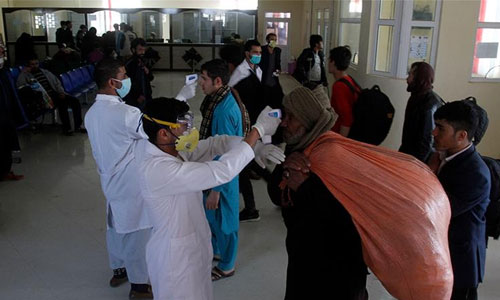Stress is a series of psychological pressures caused by various factors such as covid-19 global crisis. In global level, millions of people around the world are suffering from psychological stress but with the onset of covid-19 pandemic, the number is unprecedentedly rising. In national level, almost all people of Afghanistan are suffering from psychological pressure due to endless war, poverty and now worsening with advent of covid-19 crisis. According to experts, it will not be possible to control the stress without being familiar with the factors, symptoms, and skills of fighting and coping with it. All psychiatrists agree that being unaware of the right strategies about stress management will not only weakens the body’s immune system, but also causes many behavioral problems.
In regard to stress symptoms, it includes multiple abnormalities such as irritability and loss of control, insomnia and nightmares, fear, fatigue, headaches, lack of concentration, muscle spasms, palpitations, and nausea and so on. However, the appearances of these symptoms are not the same for all human groups. For example, the symptoms of stress in children may emerge in different ways, such as crying, sleeping disorder, and inadequate nutrition, difficulty in concentration, school relapses, headaches, and so on.
In terms of stress factors, there are so many factors that put pressure on human life but what are more common in Afghanistan includes the issues such as poverty and unemployment, war and insecurity, social disorders, and now covid-19 crisis. Covid-19 has not only imposed health risk stress but also doubled poverty related stress. More than 50% of Afghan people had been below poverty line before covid-19 crisis while it has extremely worsened the conditions. Although people are aware of pandemic risk but they widely broke quarantine due to hunger and starvation. If no vaccine produced and no fiscal attentions are paid to Afghan people, the catastrophe will be deeper than what is imagined, now.
Given the severity and extent of problems in Afghanistan, we need to design multidimensional strategy that includes economic strategy, security strategy, health strategy, psychological strategy, and so forth. This article aims to discuss about the psychological strategy which is the easiest and cheapest for some individual to follow. Based on scientific studies, there are three main strategies to deal with stress, including confrontation strategy, emotional strategy and avoiding strategy.
The first and most important strategy is confrontation strategy; it is used when someone believe that he/she is able to do something or able to solve his/her problem. In confrontation strategy, individual try to use problem solving skills, initiating good planning, and seeking expert consultation and overall use his mind to solve the problem. Therefore, learning problem-solving skills can help a person cope with stress while the unfamiliar individual with problem solving skills face with psychological conflict, hesitation and dilemma which they pave the ground for psychological stress.
The next strategy which is emotion-oriented strategy is used to reduce the individual’s unpleasant feelings. In this case, the psychological experts have introduced various techniques for controlling stress. For example, it is advised to take a deep breath, walk, drink water and count from one to ten in a state of anger and being emotional. These skills give us an opportunity to think and react wisely. If we do not use such strategies we may make unpredictable mistakes which may not be compensable in our future lives. Nevertheless, the emotion-oriented strategy is useful in the short term for calming individuals in certain condition but in longer term we need to use confrontation strategy and other which are going be explained in the following paragraphs.
The last strategy is avoiding from stressful situations when we are not able to change the situation. Based on this strategy, during covid-19 the good news is no news; we must not allow ourselves to be engulfed in negative news such as counting death rates and watching tragic corpse pictures. Thus, going through the past or worrying about the future will not change anything except destroying our personal tranquility and peace of mind. Therefore, we should always live in the present with learning new skills and getting involved in a new activity and healthy program.
In addition to the above four strategies, some writers have recommended using the formula of “eat, drink and be happy.” The first point - Eat - means having a balanced, diverse and healthy diet is effective in preventing and reducing stress. So, if anyone has no information about health literacy at least food pyramid, it is vitally important to raise their level of awareness through reading or referring to the relevant experts. Even it is said,” we are what we eat in our daily live.” The second point - drink - is referring to drinking enough fresh water averaged about 8 glasses of water a day. Unfortunately, in Afghan eating culture, people eat more but drink less while drinking more fluids is essential for active people, and conversely, dehydration can be a major health risk factor. The third point is to be happy, means happy people do not suffer from stress as much as unhappy do. Various studies show that people with a sense of humor experience less stress and are healthier. When someone makes others laughs with a sense of humor, it not only makes the stressful situations less unpleasant but receives other supports. Having sense of humor also enhances the immune systems. According a study, a number of babies whose mothers had a high sense of humor were less likely to develop infectious diseases.
Home » Opinion » Stress Management Strategy During Covid-19 Crisis and Beyond
Stress Management Strategy During Covid-19 Crisis and Beyond
| Mohammad Zahir Akbari

